ISLAMABAD/PESHAWAR: Pakistan’s polio eradication campaign has hit serious problems with an alarming spike in reported cases that has raised doubts over the quality of vaccination reporting and prompted officials to review their approach to stopping the crippling disease.
The country is one of only three in the world where polio is endemic, along with neighboring Afghanistan and Nigeria, but vaccination campaigns have cut the disease sharply, with only a dozen cases last year compared with 306 in 2014 and more than 350,000 in 1988, according to Pakistani health officials.
However, there has been a worrying jump this year, with 41 cases recorded, 33 of them in the northwestern region of Khyber Pakhtunkhwa, where many people resent what they see as intrusive and coercive vaccination campaigns often involving repeated rounds of visits, officials say.
Just as alarming for health services, environmental sampling has shown the presence of the virus in areas across the country, a clear sign of gaps in vaccination, which must cover the entire population to be effective.
Hopes that transmission of the disease could be ended this year have been abandoned.
“We need to take the bull by the horns and accept there are problems,” said Babar Atta, Prime Minister Imran Khan’s point person on polio eradication.
As well as the difficulty in reaching very remote areas and keeping track of people moving through big cities like Karachi, there have been problems in collecting reliable data, exacerbated by resistance to efforts to force vaccination.
Efforts to eradicate the disease have for years been undermined by opposition from some Islamists, who say immunization is a foreign ploy to sterilize Muslim children or a cover for Western spies.
Local officials say parents suspicious of mass immunization campaigns have been getting hold of special markers, used by health workers to put a colored spot on the little fingers of children who have been vaccinated.
“They themselves would mark the fingers of their children, in case of any official visit to countercheck the vaccinated children,” one official associated with an international organization told Reuters in the northwestern city of Peshawar.
Officials estimate that so-called fake finger marking, sometimes in collusion with health workers, is hiding the true scale of refusal rates — and thus gaps in vaccination.
In some areas, as many as 8% of families may be refusing or avoiding vaccination, a level which would mean the disease is not eradicated.
A senior official of the Health Department in Khyber Pakhtunkhwa said the exact data had been deliberately hidden by local health authorities nervous of being blamed for failing to ensure full coverage. “And the result of hiding figures had led us to face an epidemic-like situation today,” he said.
RESISTANCE
Polio, a disease transmitted through sewage which can cause crippling paralysis particularly in young children, is incurable and remains a threat to human health as long as it has not been eradicated. Immunization campaigns have succeeded in most countries and have come close in Pakistan, but persistent problems remain.
International observers have been watching the situation with alarm for some time. In October, the Independent Monitoring Board, which oversees the global polio eradication effort, wrote in its annual report that there was “something seriously wrong with the program in Pakistan.”
In April, fueled by rumors on social media that children were being poisoned by the vaccinations, mobs rioted in Khyber Pakhtunkhwa and at least three polio workers were killed.
Even without violence, many people consider polio a “US disease.” Facing more immediate threats such as a lack of clean water, many do not see why their families should be disturbed by what they consider intrusive foreign-sponsored campaigns.
Health workers, whose closeness to the communities they work in is vital in building trust, face difficult choices in remote areas where kinship and local power structures can often place them under severe pressure not to report cases of non-compliance.
According to many officials, the stubborn hostility to the campaigns and the high levels of avoidance underline the problems with heavy-handed repeat visits by health workers and police going after families that refuse vaccination.
“Why are the marker pens in the shops? Because parents want to buy them. They are sick and tired of repeated vaccinations,” said Babar Atta.
Officials are now looking at more targeted approaches to areas where there are problems overcoming resistance to vaccination involving more persuasion and education.
Oliver Rosenbauer, a spokesman for the World Health Organization, said resistance to vaccination was hampering the eradication effort although other factors, including the movement of people in Pakistan and across the border with Afghanistan were potentially more important.
He said officials were analyzing the series of problems confronting the program to build a new approach.
“What is very clear to everyone is that if things keep going the way they’re going, we’re not going to eradicate polio in Pakistan,” he said.
“We can keep a lid on it but that’s not the aim. The aim is to eradicate it.”
Fake polio markers highlight risks to Pakistan vaccination drive
Fake polio markers highlight risks to Pakistan vaccination drive
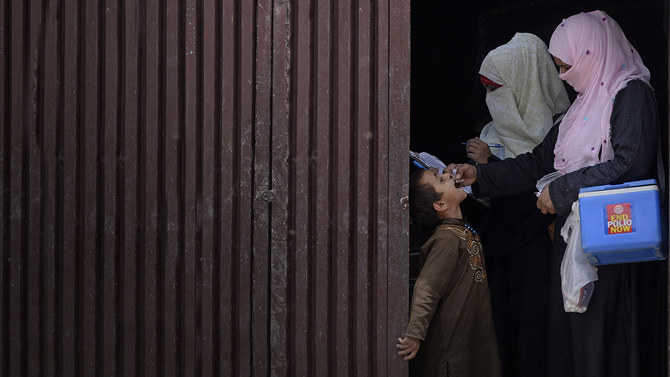
- There has been a worrying jump in polio cases in Pakistan this year
- We need to take the bull by the horns, says Pakistan’s point person on polio
Pakistan PM, Kuwaiti emir discuss transformation of bilateral ties into economic partnership
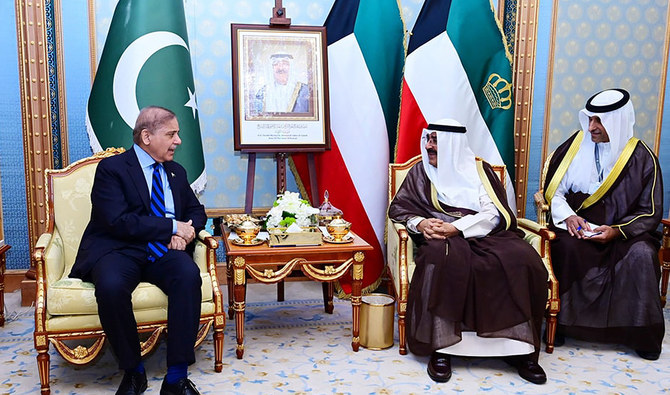
- The meeting came on the sidelines of a two-day World Economic Forum summit in Riyadh
- PM Shehbaz Sharif assured of efficient implementation of Pakistan-Kuwait deals signed in Nov.
ISLAMABAD: Pakistan Prime Minister Shehbaz Sharif on Sunday met with Emir of Kuwait Sheikh Mishal Al-Ahmad Al-Jaber Al-Sabah in Riyadh and discussed with him transformation of Pakistan-Kuwait ties into an economic partnership, Sharif’s office said.
The meeting came on the sidelines of a two-day World Economic Forum (WEF) summit on global collaboration, growth and energy on April 28-29.
PM Sharif thanked Sheikh Mishal for his congratulatory letter upon his re-election and congratulated him on assuming the role of the emir of Kuwait.
“The Prime Minister expressed his desire to work closely with His Highness to transform bilateral ties into a mutually beneficial economic partnership that would serve the best interests of the peoples of both countries,” Sharif’s office said in a statement.
The development came months after Pakistan and Kuwait signed several trade and investment agreements worth $10 billion during the visit of caretaker Pakistan PM Anwaar-ul-Haq Kakar to the Gulf country.
Besides these agreements, the two countries had signed three memorandums of understanding (MoUs) in the fields of culture, environment and sustainable development.
Pakistan’s army chief, General Asim Munir, had also accompanied the caretaker prime minister on the Kuwait visit in November, which was part of the Pakistani leadership’s ambitious plan to attract investment from the Middle East amid an economic slowdown at home.
“The Prime Minister assured the Kuwaiti leadership that these MoUs and agreements would be implemented in an efficient and timely manner,” the statement added.
“In addition to bilateral ties, the regional situation, particularly with regards to the crisis in Gaza, was also discussed.”
PM Sharif, IMF chief discuss Pakistan’s new loan program on WEF sidelines in Riyadh
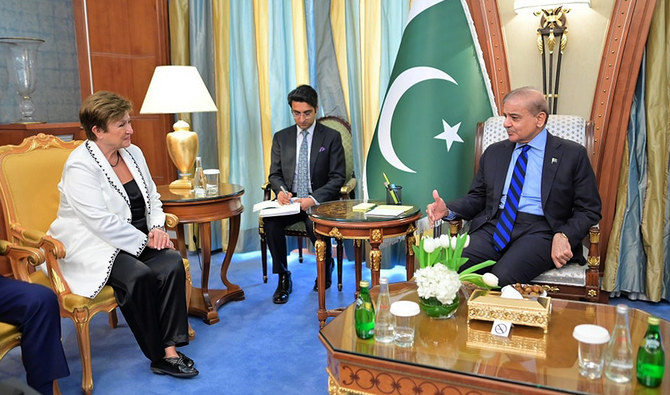
- Pakistan’s $3 billion IMF loan program, which helped Islamabad avert a default last year, is due to end this month
- Pakistan faces a chronic balance of payments crisis, with nearly $24 billion to repay in debt over next fiscal year
ISLAMABAD: Pakistan Prime Minister Shehbaz Sharif on Sunday met with International Monetary Fund (IMF) Managing Director Kristalina Georgieva in Riyadh, where the two figures discussed a new loan program for the cash-strapped South Asian country, Sharif’s office said.
The meeting between PM Sharif and the IMF managing director took place on the sidelines of a two-day World Economic Forum (WEF) summit on global collaboration, growth and energy in the Saudi capital on April 28-29.
Sharif thanked Georgieva for her support to Pakistan in securing a $3 billion IMF loan program last year that is due to expire this month. The IMF executive board is expected to meet on Monday to decide on the disbursement of the final tranche of $1.1 billion to Pakistan.
“MD IMF shared her institution’s perspective on the ongoing program with Pakistan, including the review process,” PM Sharif’s office said in a statement.
“Both sides also discussed Pakistan entering into another IMF program to ensure that the gains made in the past year are consolidated and its economic growth trajectory remains positive.”
Sharif informed the IMF chief that his government was fully committed to put Pakistan’s economy back on track, according to the statement.
He said he had directed his financial team, led by Finance Minister Muhammad Aurangzeb, to carry out structural reforms, ensure strict fiscal discipline and pursue prudent policies that would ensure macro-economic stability and sustained economic growth.
Pakistan secured the $3 billion IMF program in June last year, which helped it avert a sovereign default. Islamabad says it is seeking a loan over at least three years to help achieve macroeconomic stability and execute long-overdue reforms.
Finance Minister Aurangzeb has said Islamabad could secure a staff-level agreement on the new program by early July, though he has declined to detail what size of the program it seeks. If secured, it would be Pakistan’s 24th IMF bailout.
The $350 billion South Asian economy faces a chronic balance of payments crisis, with nearly $24 billion to repay in debt and interest over the next fiscal year — three-time more than its central bank’s foreign currency reserves.
Pakistan’s finance ministry expects the economy to grow by 2.6 percent in the fiscal year ending in June, while average inflation for the year is projected to stand at 24 percent, down from 29.2 percent the previous fiscal year.
Saudi ministers assure PM Sharif of support for Pakistan’s development — PM’s office
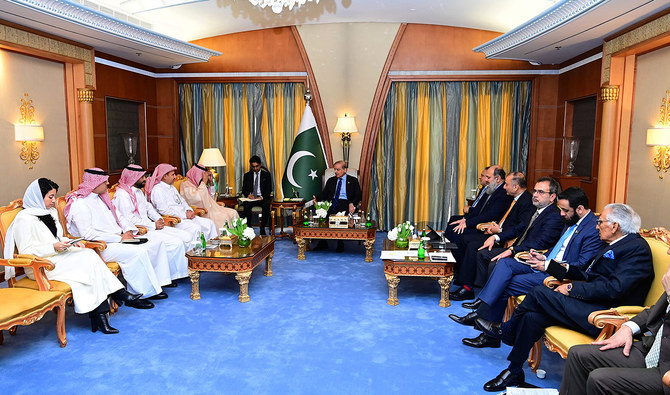
- PM Shehbaz Sharif is in Riyadh to attend WEF meeting on global collaboration, growth and energy
- On Sunday, he met with Saudi Arabia’s minister of finance, investment, and industry and minerals
ISLAMABAD: Prime Minister Shehbaz Sharif on Sunday met with Saudi Arabia’s ministers of finance, investment and industry in Riyadh on the sidelines of a World Economic Forum (WEF) meeting, Sharif’s office said, adding that the Saudi ministers assured him of the Kingdom’s support for Pakistan’s development.
The Pakistan prime minister arrived in Riyadh on Saturday to attend the WEF meeting on global collaboration, growth and energy on April 28-29, after being extended an invitation by Crown Prince Mohammed bin Salman and Professor Klaus Schwab, the WEF executive chairman.
On the sidelines of the WEF meeting, Sharif held separate meetings with Saudi Arabia’s Finance Minister Mohammed Al-Jadaan, Investment Minister Khalid Al-Falih, and Industry and Mineral Resources Minister Bandar Alkhorayef, according to the Pakistan PM’s office.
In his meeting with the Saudi finance minister, the two sides agreed that Saudi Arabia would explore more opportunities for investment in Pakistan.
“The Saudi finance minister reiterated Saudi Arabia’s support for Pakistan’s economic development,” Sharif’s office said in a statement.
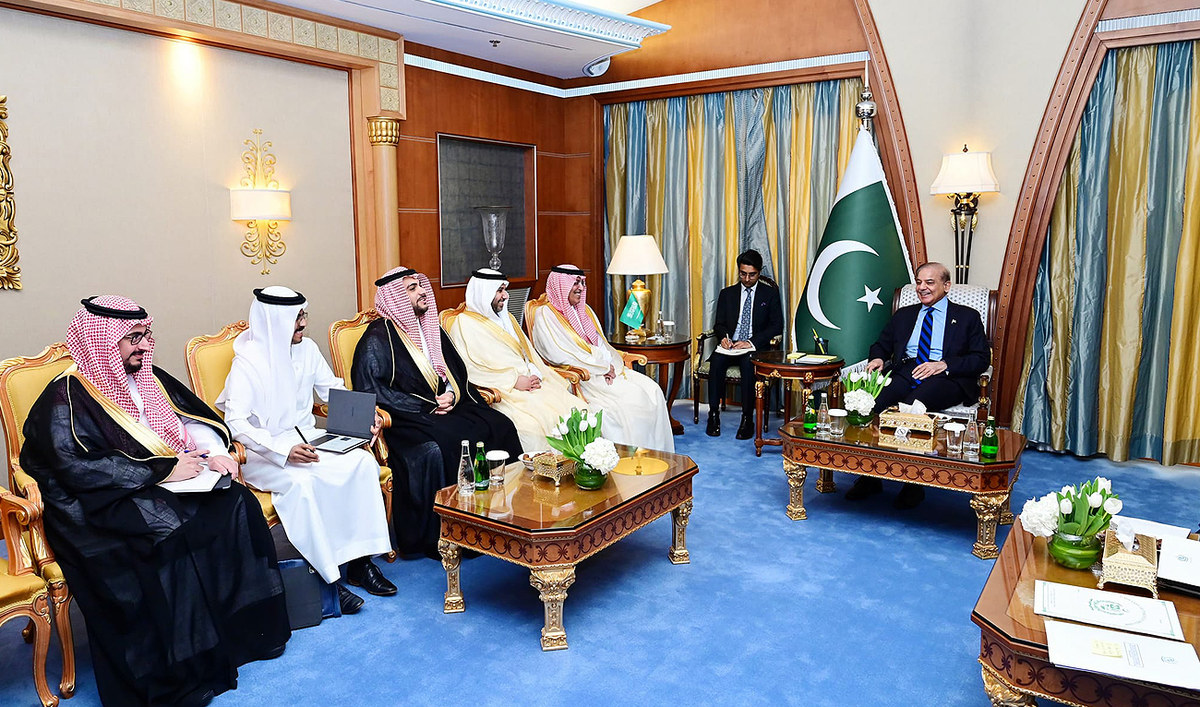
The Saudi investment minister acknowledged PM Sharif’s efforts for Pakistan’s growth and prosperity.
“A delegation of Saudi investors will soon visit Pakistan,” he was quoted as saying by Sharif’s office.
“Pakistan is our priority in terms of investment. Both sides will continue to fully cooperate in agriculture, information technology (IT) and energy sector.”
Pakistan and Saudi Arabia enjoy strong trade, defense and cultural ties. The Kingdom is home to over 2.7 million Pakistani expatriates and serves as the top source of remittances to the cash-strapped South Asian country.
Both Pakistan and Saudi Arabia have been closely working to increase their bilateral trade and investment, and the Kingdom recently reaffirmed its commitment to expedite an investment package worth $5 billion discussed previously with Islamabad.
In his meeting with the prime minister, Saudi Arabia’s Industry and Mineral Resources Minister Bandar Alkhorayef expressed “deep interest” in cooperation with Pakistan in agriculture, minerals, IT and other sectors, according to Sharif’s office.
“I am in touch with Saudi private companies regarding investment in Pakistan and [representatives of] these companies will visit Pakistan very soon,” the Saudi minister was quoted as telling PM Sharif.
“Cooperation between private sectors of the two countries is among our top priorities.”
PM Sharif thanked Saudi Arabia’s King Salman and Crown Prince Mohammed bin Salman as well as the Saudi ministers for supporting Pakistan in every difficulty.
“During my previous government, our economic situation improved, thanks to Saudi Arabia’s support and assistance,” he said, describing both countries as strategic partners.
Pakistan’s Foreign Minister Ishaq Dar, Finance Minister Muhammad Aurangzeb and other members of PM Sharif’s cabinet were also present at the meetings.
Foreign Minister Ishaq Dar appointed deputy prime minister of Pakistan
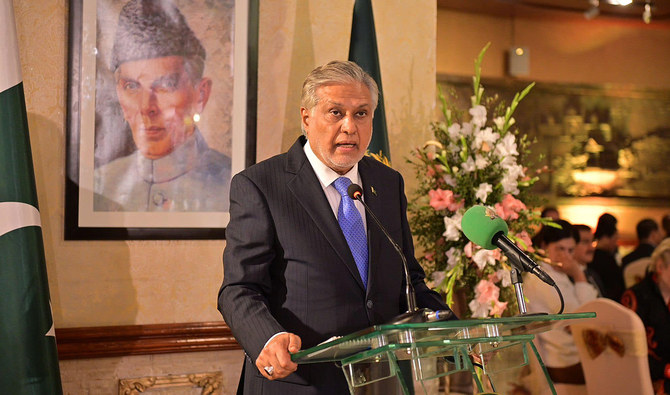
- Dar, a chartered accountant and a seasoned politician, is considered closest ally of Nawaz Sharif, PM Shehbaz Sharif’s elder brother and three-time former PM
- Many believe Dar’s appointment indicates that Nawaz, who didn’t take PM’s office due to split mandate in Feb.8 vote, is trying to assert his control indirectly
ISLAMABAD: Pakistan Prime Minister Shehbaz Sharif has appointed Foreign Minister Ishaq Dar deputy prime minister of the country, the Pakistani government said on Sunday.
Dar, who is a former four-time finance minister of Pakistan, was earlier made the head of a special committee of PM Sharif’s cabinet on privatization.
The 73-year-old chartered accountant is considered to be the closest ally of PM Sharif’s elder brother, Nawaz Sharif, who is also a three-time former prime minister.
“The prime minister has been pleased to designate Mr.Mohammad Ishaq Dar, Federal Minister for Foreign Affairs, as Deputy Prime Minister with immediate effect and until further orders,” read a notification issued from the Cabinet Division.
Nawaz, who returned to Pakistan in October 2023 after having spent years in self-exile, was seen as the favorite candidate for the PM’s office ahead of the Feb. 8 national election and was widely believed to be backed by the country’s powerful army.
But the three-time former prime minister decided not to take the PM’s office after the Feb. 8 vote did not present a clear winner, leading to speculation that his role in the country’s politics had come to an end.
But many believe Dar’s appointment to the deputy prime minister’s slot is an indication that Nawaz is trying to assert his control of government through indirect ways.
Prior to Dar, Chaudhry Pervaiz Elahi was appointed the deputy prime minister of Pakistan in 2012.
In Pakistan’s Peshawar, famed ‘Taj Soda’ has been cooling summers for nearly 90 years
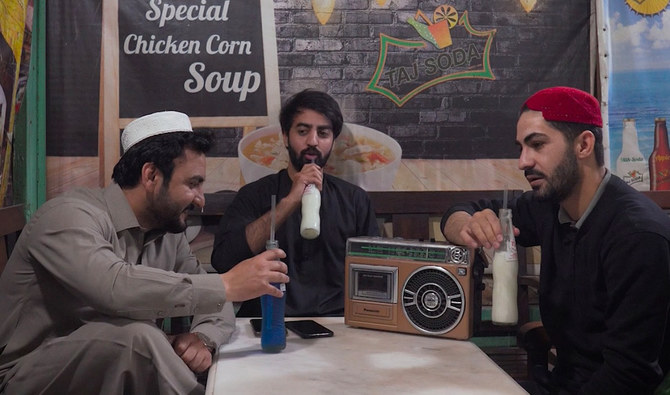
- Taj Soda in Peshawar’s historic Qissa Khwani bazaar offers raspberry, blueberry, mint and several other seasonal flavors
- For some, the establishment, set up in 1936, provides an alternative to the city’s famed ‘qahwa,’ or green tea, in summers
PESHAWAR: One is greeted by the sounds of glass bottles clinking and their brass lids pop-opening as they enter a nearly 90-year-old soft drink outlet, named ‘Taj Soda,’ in the historic Qissa Khwani bazaar in the northwestern Pakistani city of Peshawar.
The visitors are led through a three-feet-wide passage into a hall room, which boasts benches and tables for customers to sit and enjoy their favorite drinks, with its walls adorned with pictures that depict the city’s history through the ages.
Taj Soda, established by Taj Muhammad more than a decade before the partition of the Indian subcontinent, claims to be the “oldest” carbonated drink outlet in Pakistan, which few say provides an alternative to Peshawar’s famed ‘qahwa,’ or green tea, in summers.
“My grandfather’s name was Taj Muhammad, who established this business in 1936. After him, my father Mukhtar Hussain, may he rest in peace, he ran the business for his whole life for 76 years,” Waqas Hussain, Muhammad’s 33-year-old grandson who currently runs the establishment, told Arab News on Friday.
“Our work goes on in six months of summer.”
The outlet, which offers a range of flavors like raspberry, blueberry, pomegranate, apple, rose, banana, mango and mint, is mostly frequented by customers from April till September, though it offers the cherished soft drinks round the year, according to the owner.
A simple drink, made with carbonated water, sugar, sodium citrate and benzoate, is sold for Rs50, while those with the addition of milk cost Rs80.
“We start [selling] soup in winter and we do serve cold drinks, soda water, but it is not like this [as high in demand as in summers],” Hussain said.
Usman Khan, a 21-year-old resident of Peshawar who took a group of friends on a tour of the city, said he brought them to Taj Soda to introduce them to the historic establishment, which was said to be older than even 7 Up, an American brand of lemon lime-flavored, non-caffeinated soft drink.
“They all are my friends, they are from different places. One is from Balochistan and the other is from Kohistan [in Khyber Pakhtunkhwa]. I have brought all of them here,” Khan told Arab News.
“The reason is that it is an old building and was made in 1936. I heard that Taj Soda was established [even] before 7 Up, but this is our bad luck that ... Taj Soda is restricted only to this place. No one knows about it outside [the city].”
But for Hussain, Taj Soda means more than just profit. It is about keeping the legacy of his father and grandfather alive.
“We try not to spoil the name of [our] elders and make the best product, and people trust us,” he told Arab News, with a sense of pride.
“Wherever we go, people know us. We feel happy about it.”









